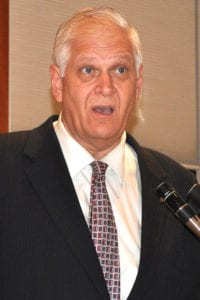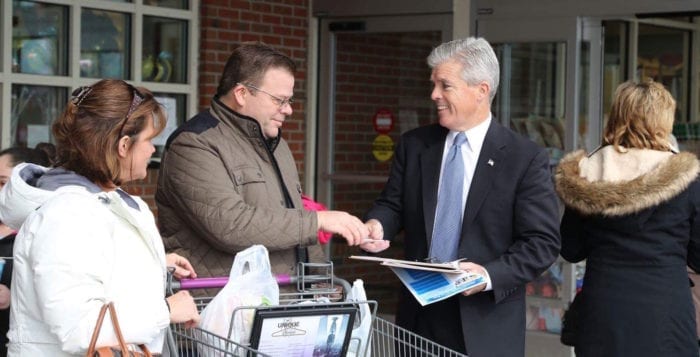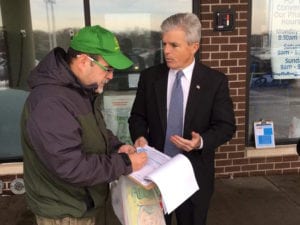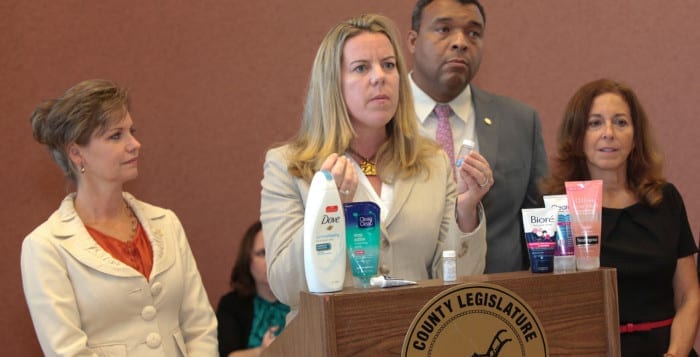By Kevin Redding
Suffolk County elected officials learned last week that with perseverance comes preservation.
In a surprising move, Gov. Andrew Cuomo (D) unveiled in his 2018-19 executive budget Jan. 16 that roughly 840 acres in Shoreham would be preserved as part of an expansion of Long Island’s publicly protected Central Pine Barrens. This proposal — which, if the budget is passed, would make the scenic stretch of property surrounding the abandoned Shoreham nuclear power plant off limits to developers — came less than a month after Cuomo vetoed a bill co-sponsored by state Assemblyman Steve Englebright (D-Setauket) and state Sen. Ken LaValle (R-Port Jefferson) calling for that very action.

“We saw that he did a cut and paste of our bill,” Englebright said. “It left in all of the language from our bill for the Shoreham site and now that’s in the proposed executive budget. That is really significant because, with this initiative as an amendment to the Pine Barrens, this will really have a dramatic long-term impact on helping to stabilize the land use of the eastern half of Long Island. The governor could do something weird, but as far as Shoreham goes, it is likely he will hold his words, which are our words.”
The bill, which passed overwhelmingly through the two houses of the Legislature in June but was axed by the governor Dec. 18, aimed to protect both the Shoreham property and a 100-acre parcel of Mastic woods from being dismantled and developed into solar farms.
Both Englebright and LaValle, as well as Brookhaven Town Supervisor Ed Romaine (R), pushed that while they provide an important renewable energy, solar panels should not be installed on pristine ecosystems. They even worked right up until the veto was issued to provide a list of alternative, town-owned sites for solar installation “that did not require the removal of a single tree,” according to Romaine.
In Cuomo’s veto, he wrote, “to sign the bill as drafted would be a step in the wrong direction by moving away from a clean energy future instead of leaning into it.” Englebright said he and his colleagues planned to re-introduce the legislation a week or two after the veto was issued and was actively working on it when the proposed budget was released.
The legislation’s Mastic portion, however, was not part of the budget — an exclusion Englebright said he wasn’t surprised by.

“During negotiations leading up to the bill’s veto, the governor’s representatives put forward that we let Mastic go and just do Shoreham — we rejected that,” he said. “We didn’t want to set that precedent of one site against the other. So he vetoed the bill. But his ego was already tied into it.”
The 100 acres on the Mastic property — at the headwaters of the Forge River — is owned by Jerry Rosengarten, who hired a lobbyist for Cuomo to veto the bill. He is expected to move ahead with plans for the Middle Island Solar Farm, a 67,000-panel green energy development on the property. But Englebright said he hasn’t given up on Mastic.
“We’re standing still in the direction of preservation for both sites,” he said. “My hope is that some of the ideas I was advocating for during those negotiations leading up to the veto will be considered.”
Romaine said he is on Englebright’s side.
“While I support the governor’s initiative and anything that preserves land and adds to the Pine Barrens, obviously my preference would be for Steve Englebright’s bill to go forward,” Romaine said. “There are areas where developments should take place, but those two particular sites are not where development should take place.”
Dick Amper, executive director of the Long Island Pine Barrens Society, who has been vocal against the veto and proposals for solar on both sites, said Cuomo is moving in the right direction with this decision.
“It’s clear that the governor wants to avoid a false choice such as cutting down Pine Barrens to construct solar,” Amper said. “I think he wants land and water protected on the one hand and solar and wind developed on the other hand. I believe we can have all of these by directing solar to rooftops, parking lots and previously cleared land.”









